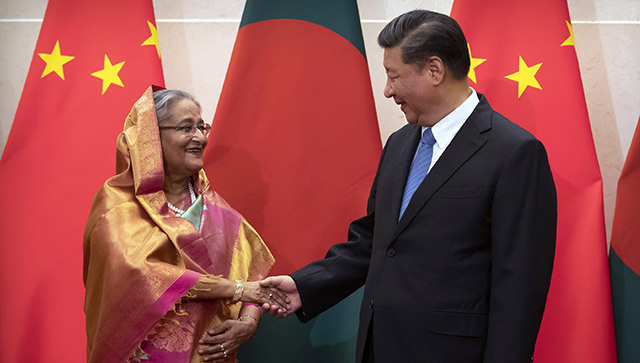The recent statement made by China regarding protecting Bangladesh from any sort of external interference in the context of the US making statements on the fairness of elections in Bangladesh holds significance for India. Such acts on the part of China have been repeatedly occurring, whether in the form of the invalid claim of including Arunachal Pradesh and Aksai Chin as part of its own territory. Additionally, China has exerted its economic control through initiatives like the Belt and Road Initiative in India’s neighbours such as Pakistan, Sri Lanka and Bangladesh by establishing projects like the China-Pakistan Economic Corridor and the Bangladesh-China-India-Myanmar Economic Corridor, which aim to integrate the economies of these countries through regional connectivity. These projects fit within the Chinese notion of the Silk Road and Economic Belt and the 21st century Maritime Silk Road. There are several studies that have cautioned about the deep and serious impact of Chinese loans but due to the absence of viable alternatives countries still are attracted to it for their infrastructure developments. In this context, the questions that require analysis pertain to Bangladesh and Chinese economic relations, the Belt and Road Initiative and its link with Bangladesh, the debt trap policy that China has been pursuing whose repercussions were seen in Sri Lanka and finally the impact of all such steps on India and the possible way forward in this regard. Historically, the relationship between Bangladesh and Sri Lanka took shape in the aftermath of the independence achieved by Bangladesh in 1971 where India had played an integral role. Surprisingly China had opposed the inclusion of Bangladesh as a member of the UN through veto which stands in complete contrast to its recent statement of protecting Bangladesh which is being seen in the context of the ulterior motives of China to capture the Bangladeshi market through the Belt and Road initiative. Especially, since the rollout of the ‘One Belt One Road’ policy, several countries including Bangladesh have obtained Chinese loans for infrastructure developments that lead to the risk of asset seizure by China for Bangladesh. The aim of the Belt and Road initiative is to make the Chinese yuan the currency of international transactions with an aim to enable the reduction of economic dependence on the US for the countries that support them for which Bangladesh holds the key. The reason being that Bangladesh is located strategically between South Asia and South East Asia and has a growing economy and abundant labour force. Further, Bangladesh’s economic security is strategically important for entire South Asia more specifically for India. What this means is that the Chinese through their policies engage in debt trap diplomacy of which Bangladesh may be a target and Sri Lanka has already become a victim. Such claims draw their legitimacy through certain findings of institutions like the UN Economic and Social Commission for the Asia Pacific that point out that large-scale grants to developing countries could potentially harm the macroeconomic stability of these countries due to the underdeveloped nature of the market and insufficient debt management capacity. Coming back to India’s interests, recently Indian prime minister in a BRICS meeting said that the economic security of one country is an integral part of national security. In the last few years, India has cancelled many Chinese investments due to national security. In the past, India has taken steps to navigate the Chinese threat of the Belt and Road Initiative by establishing the Bangladesh-Bhutan-India-Nepal initiative and at the international level, the Asia-Africa Growth Corridor and labeled it as a special and strategic global partnership. At a larger level, the countries that are becoming economically and politically dependent on China must take steps focusing on the need for poverty alleviation through employment, education and healthcare provisions with an emphasis on a human needs perspective that focuses on identity, security, recognition, participation, dignity and justice to reduce their dependence on China. The authors are assistant professors, OP Jindal Global University. Views expressed in the above piece are personal and solely that of the author. They do not necessarily reflect Firstpost’s views. Read all the Latest News , Trending News , Cricket News , Bollywood News , India News and Entertainment News here. Follow us on Facebook , Twitter and Instagram .
Why China's expanding footprint in Bangladesh and beyond is a strategic concern for India
Abhinav Mehrotra and Biswanath Gupta
• September 20, 2023, 07:25:31 IST
China’s commitment to protect Bangladesh from external interference triggers India’s apprehension about Beijing’s increasing regional influence through economic initiatives and the potential risks associated with debt trap diplomacy
Advertisement
)
End of Article